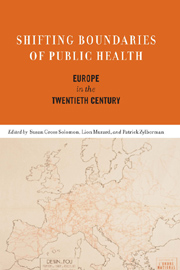Book contents
- Frontmatter
- Contents
- Preface
- Introduction
- Part One Place as Politics
- Part Two Carving Out the International
- 3 American Foundations and the Internationalizing of Public Health
- 4 Maneuvering for Space: International Health Work of the League of Nations during World War II
- 5 Europe, America, and the Space of International Health
- Part Three Preserving the Local
- Part Four Navigating between International and Local
- Selected Bibliography
- List of Contributors
- Index
3 - American Foundations and the Internationalizing of Public Health
from Part Two - Carving Out the International
Published online by Cambridge University Press: 12 September 2012
- Frontmatter
- Contents
- Preface
- Introduction
- Part One Place as Politics
- Part Two Carving Out the International
- 3 American Foundations and the Internationalizing of Public Health
- 4 Maneuvering for Space: International Health Work of the League of Nations during World War II
- 5 Europe, America, and the Space of International Health
- Part Three Preserving the Local
- Part Four Navigating between International and Local
- Selected Bibliography
- List of Contributors
- Index
Summary
Foundations as International Organizations
American foundations have been powerhouses of international health reform. They supported a broad spectrum of policies, encompassing laboratory research, public health training, and sanitary fieldwork. Infectious and parasitic diseases, mental health, and drug therapy have at various times appeared on foundation agendas. These programs have involved strategic evaluation of some fundamental problems: how to measure health and disease and their economic costs, how most efficiently to turn discoveries in the laboratory into preventive policies, and how to calculate the prospects for wholesale eradication of infectious diseases. Foundations have had greater freedom than state agencies to support experimental projects and to disseminate standards based on best practice derived through international training programs.
The foundations' varied activities have given rise to conflicting interpretations of their role as social agencies. Some scholars have taken the medical programs at face value as promoting disinterested advancement of medicine for human benefit. According to these accounts, in their visionary support for cultural and medical projects, donors such as John D. Rockefeller, Jr. assume an almost saintly quality. Since the mid-1970s, a wave of critical studies examined foundations as agencies of imperialism, including cultural imperialism, disseminating American cultural and political values in expert-led public health programs. These studies claimed that the foundations expressed the class interests of trustees, who were generally recruited from elites in industry and banking, leavened by professional leaders in law and medicine.
- Type
- Chapter
- Information
- Shifting Boundaries of Public HealthEurope in the Twentieth Century, pp. 63 - 86Publisher: Boydell & BrewerPrint publication year: 2008



